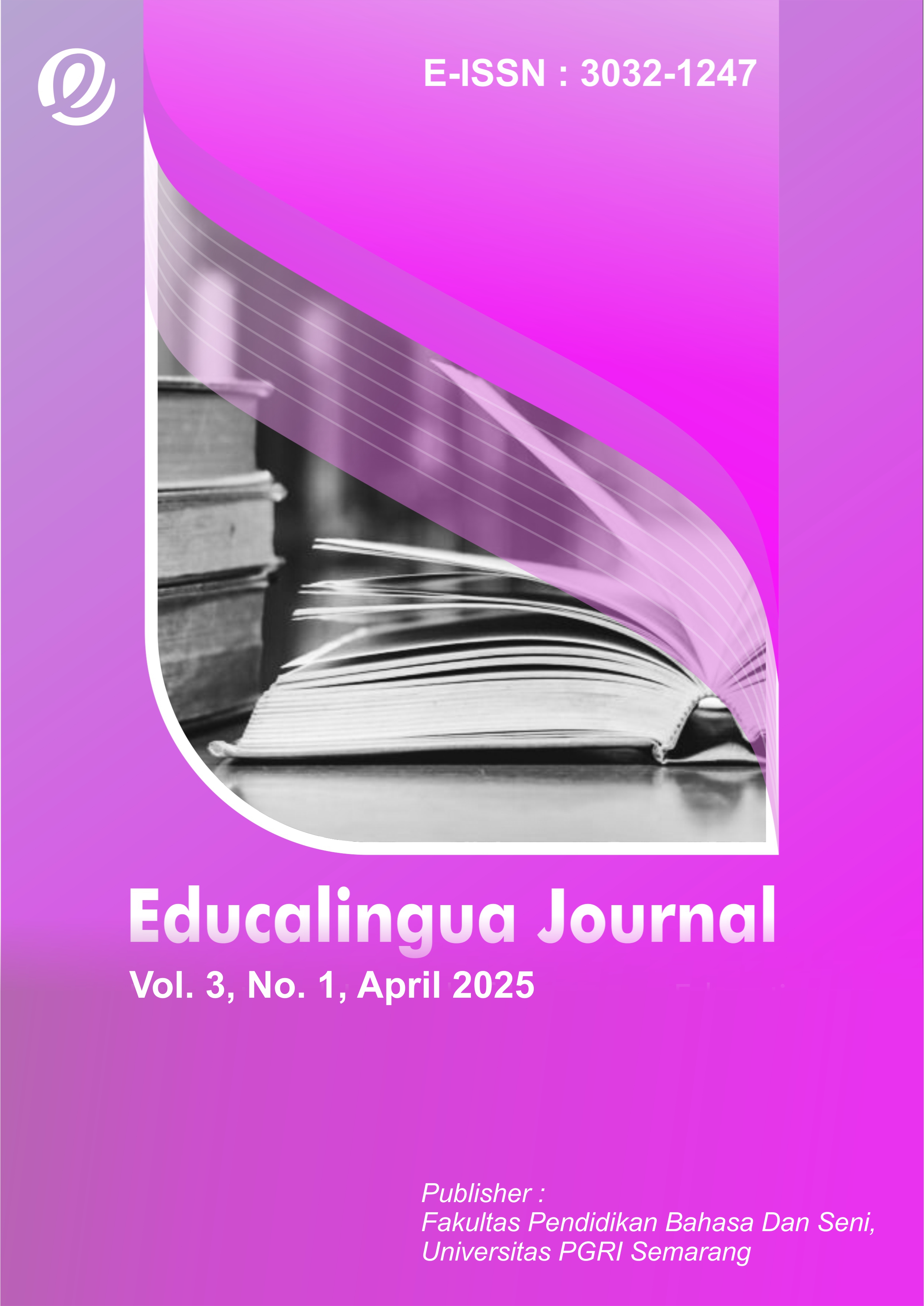3Ps-Based Game for Teaching Vocabulary to Young Learners
DOI:
https://doi.org/10.26877/educalingua.v3i1.1853Keywords:
3Ps, game-based learning, language acquisition, vocabulary instruction, young learnersAbstract
This study highlights the importance of building strong self-regulated motivation in EFL learners before engaging them in academic writing tasks. Motivation plays a vital role in helping learners handle the challenges of academic writing and develop effective learning strategies. This small-scale library research aimed to explore how self-regulated motivation supports the improvement of EFL learners’ writing skills. A thematic analysis was conducted on 25 studies related to self-regulated motivation and academic writing to ensure the relevance and reliability of the findings. The results revealed two main outcomes: (1) self-regulated motivation helps learners become more organized in their writing process, and (2) it enables them to achieve better academic writing outcomes. These findings emphasize the need for educators to promote self-regulation in writing instruction to support learners’ long-term academic growth.
References
Amalia, H., Abdullah, F., & Fatimah, A. (2021). Teaching writing to junior high school students: A focus on challenges and solutions. Journal of Language and Linguistic Studies, 17(S2), 794–810.
Ammade, S., & Yanti Ziska, I. (2021). Animation film in writing teaching instruction on narrative text: Working or not working? Language Circle: Journal of Language and Literature, 16(1), 81–88.
Arifin, Z. (2020). Evaluasi pembelajaran: Prinsip, teknik, dan prosedur. Remaja Rosdakarya.
Brown, H. D. (2004). Language assessment: Principles and classroom practices. Pearson.
Brown, H. D. (2021). Teaching by principles: An interactive approach to language pedagogy (4th ed.). Pearson.
Cameron, L. (2020). Teaching languages to young learners (2nd ed.). Cambridge University Press.
Chai, K. N., & Yunus, M. M. (2021). Vocabulary Connect Four Circles (VC4C) card game for Malaysian young learners’ vocabulary learning. International Journal of Academic Research in Business and Social Sciences, 11(1), 552–574.
Creswell, J. W., & Poth, C. N. (2018). Qualitative inquiry and research design: Choosing among five approaches (4th ed.). SAGE Publications.
Daryanto. (2019). Media pembelajaran: Peranannya dalam meningkatkan hasil belajar siswa. Gava Media.
Dehghanzadeh, H., Jafaraghaee, F., & Nedjat, S. (2021). Effectiveness of game-based learning in education: A meta-analysis. Journal of Educational Psychology, 113(6), 1000–1025.
Ellis, R. (2019). Understanding second language acquisition (2nd ed.). Oxford University Press.
Firman, M. (2022). The use of literature in teaching English to enhance EFL students’ writing skill. Journal of Educational Study, 2(1), 35–42. https://doi.org/10.36663/joes.v2i1.222
Giorgdze, M., & Dgebuadze, M. (2017). Interactive teaching methods: Challenges and perspectives. IJAEDU-International E-Journal of Advances in Education, III. http://ijaedu.ocerintjournals.org
Hadfield, J. (2019). Classroom dynamics: Using games to enhance language learning. Cambridge University Press.
Hiver, P., Al-Hoorie, A. H., & Mercer, S. (Eds.). (2021). Student engagement in the language classroom. Multilingual Matters.
Hsu, C. K. (2017). Learning motivation and adaptive video game-based learning: The role of game features, learning achievements, and gender. Educational Technology & Society, 20(1), 127–139.
Ke, F., Shute, V. J., Clark, K. M., & Erlebacher, G. (2016). Designing adaptive learning and assessment in digital games. Advances in Human-Computer Interaction, 2016, 1–11.
Kovács, G., & Gábor, K. (2021). 21st-century challenges in motivating learners to improve English vocabulary. Journal of Language and Education, 7(3), 50–63.
Lukas, B., Patrick, F. I., Chong, G., Jaino, M., & Yunus, M. M. (2020). Using U-NO-Me card game to enhance primary one pupils’ vocabulary. International Journal of Learning, Teaching and Educational Research, 19(5), 304–317.
Mashhadi, F., & Jamalifar, G. (2015). Second language vocabulary learning through visual and textual representation. Procedia - Social and Behavioral Sciences, 192, 298–307. https://doi.org/10.1016/j.sbspro.2015.06.043
Mehregan, M. (2014). Game-based tasks for foreign language instruction: Perspectives on young learners’ vocabulary acquisition. IAFOR Journal of Language Learning, 1(1). https://doi.org/10.22492/ijll.1.1.03
Ngu, S. L., & Abdul Aziz, A. (2022). The effectiveness of game-based learning strategies on primary ESL learners’ vocabulary learning. International Journal of Academic Research in Progressive Education and Development, 11(2), 845–860.
Philp, J., & Duchesne, S. (2016). Exploring engagement in tasks in the language classroom. Annual Review of Applied Linguistics, 36, 50–72.
Plass, J. L., Homer, B. D., & Kinzer, C. K. (2015). Foundations of game-based learning. Educational Psychologist, 50(4), 258–283.
Qasim, A. (2021). Impact of digital games on incidental vocabulary acquisition of Pakistani high school students. Asian EFL Journal, 28(1), 206–224.
Rohmatillah. (2014). A study on students’ difficulties in learning vocabulary. English Education: Jurnal Tadris Bahasa Inggris IAIN Raden Intan, 6(1), 75–93.
Schmidt, R. (2000). Attention. In P. Robinson (Ed.), Cognition and second language instruction (pp. 3–32). Cambridge University Press.
Shin, J. (2020). Effective strategies for optimizing instructional time in language classrooms. Journal of Language Teaching and Research, 11(2), 123–130.
Sousa, M. J., & Rocha, A. (2019). Leadership styles and skills developed through game-based learning. Journal of Business Research, 94, 360–366. https://doi.org/10.1016/j.jbusres.2018.01.057
Vygotsky, L. S. (1978). Mind in society: The development of higher psychological processes. Harvard University Press.








